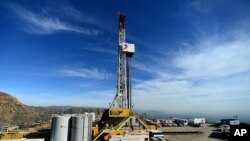Rules issued Thursday aim to cut greenhouse gas emissions from new U.S. oil and gas wells, which experts say are responsible for much more climate pollution than previously thought.
Oil and gas production have boomed in the United States as hydraulic fracturing and other technologies have opened up novel sources. It's been good news for consumers as gas prices have dropped. And it's been good news for the environment as power plants have replaced coal with cleaner natural gas. It's one big reason that carbon dioxide emissions from power generation declined about 10 percent from 2007 to 2014.
But as oil and gas wells have mushroomed, concerns about methane leakage have grown.
Methane, the main component of natural gas, is 25 times more powerful a heat trapping gas than carbon dioxide.
It's unclear exactly how much of the gas is escaping along the energy production and delivery system, but recent estimates are much higher than previously thought. The Environmental Protection Agency says methane is the second-largest contributor to U.S. greenhouse gas emissions, and a third of U.S. methane emissions come from the oil and gas industry.
More monitoring, repairs
The new rules call for companies to do more to monitor and fix leaks, among other steps.
"Every leak that is fixed means more gas is available to be used or sold, and less pollution is affecting our communities, as well as the stability of our climate," said EPA Administrator Gina McCarthy.
The Obama administration set a goal of reducing the sector's methane emissions by at least 40 percent by 2025.
The oil and gas industry says it already is reducing emissions voluntarily, and that the rules are unnecessary.
"It doesn’t make sense that the administration would add unreasonable and overly burdensome regulations when the industry is already leading the way in reducing emissions," said Kyle Isakower, vice president of regulatory and economic policy at the American Petroleum Institute.
But environmental groups describe the rules as only a first step. The rules cover only new or modified systems. Rulemaking is just beginning for existing sources and is not likely to be completed by the end of President Barack Obama's term.




